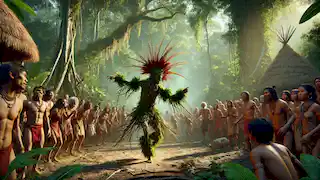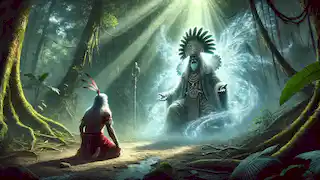The Tale of the Jurupari
Reading time: 7 min

About this story: The Tale of the Jurupari is a Legend from Brazil set in the Ancient This Descriptive tale explores themes of Nature and is suitable for All Ages. It offers Moral insights. A tale of ancient wisdom, power, and the spirit of the Amazon.
In the heart of the Amazon, where the dense rainforest hums with life, and rivers weave stories as old as time, the tale of the Jurupari was born. This legend, told by the indigenous Tupi people, has been whispered through the ages, a story of gods, mortals, and the mysterious powers that bind them. To understand the Amazon is to know its legends, and the story of the Jurupari is one of the oldest and most sacred of all.
The Origins of the Jurupari
Long ago, when the world was young, the gods roamed freely. They moved through the lands and rivers, shaping the earth with their powers. Among these gods was Tupa, the great spirit of creation and life. Tupa breathed life into the land, creating vast forests, mountains, and rivers. But he did not act alone; with him was the goddess Iara, keeper of the waters, whose flowing rivers brought nourishment to the land.
It was a time of harmony, but all was not perfect. Among the lesser gods was Jurupari, a spirit of both beauty and danger. Jurupari was an enigma, a being born from the mysteries of the forest. While other gods sought to bring order, Jurupari represented the wild, untamed spirit of nature itself. He appeared as a handsome young man, yet his eyes held secrets that few could understand. To look upon Jurupari was to feel the pull of the wild, to sense the call of something primal and beyond human control.
Though he was of the gods, Jurupari had a yearning that set him apart. He was drawn to the human world and, more than anything, wished to understand the people who worshipped the spirits of the land. As he observed them, he noticed that they held great reverence for the gods but also great fear. And so, driven by his curiosity, Jurupari took a mortal form and descended to earth.
Jurupari Among the People
Jurupari walked among the Tupi people, who lived along the rivers and in the heart of the jungle. He observed their lives, their rituals, and the way they honored the gods. In particular, he was fascinated by their sacred ceremonies, dances, and songs that connected them to the spirits. The people sensed something strange about the newcomer in their midst, for Jurupari was beautiful yet unsettling, a presence that was both comforting and intimidating.
One night, during a festival honoring Tupa, Jurupari joined the dancers. His movements were graceful and powerful, as if he held the very rhythm of the jungle within him. The people watched, entranced, feeling an energy they had never known before. When the dance ended, Jurupari spoke, his voice deep and hypnotic.
"I am Jurupari," he declared, "born of the jungle and keeper of its secrets. I have come to teach you the ways of the forest, to show you the path to harmony with nature."
The people listened in awe, for they sensed the truth in his words. Jurupari became a teacher among them, showing them the hidden knowledge of the forest—the herbs that healed, the waters that purified, the songs that spoke to the spirits. But his teachings came with a price, for he demanded that they respect the jungle's power and mystery.

The Forbidden Knowledge
As time passed, Jurupari’s influence grew. His teachings spread, and soon, all the tribes along the river knew of him. He became a revered figure, both feared and respected. Yet, Jurupari was not a gentle teacher. He imposed strict rules, forbidding certain knowledge from women and younger men. Only the elders and initiated could learn the deepest secrets of the jungle.
This division created unrest, for the women of the tribe felt a strong connection to the land and resented being excluded. Among them was a woman named Anahi, a healer and one of the wisest among the people. She watched as her husband and sons attended Jurupari’s teachings, while she was left to wait. The restrictions weighed heavily on her, and soon, her frustration grew into defiance.
One night, as the men gathered for a ceremony, Anahi crept into the sacred place where Jurupari taught. She hid among the trees, listening to his words and observing the rituals. But as she watched, something unexpected happened. Jurupari stopped mid-sentence, his eyes narrowing as if sensing her presence. Suddenly, he called out, “Who dares to intrude on this sacred gathering?”
Terrified yet defiant, Anahi stepped forward. “I am Anahi,” she declared. “I come not to defy but to learn. The knowledge of the forest should belong to all who live within it, not only to men.”
Jurupari's gaze turned cold. “You have violated a sacred law,” he replied. “This knowledge is forbidden to women. You have challenged the will of the spirits.”
But Anahi stood firm, her voice unwavering. “I have only followed the call of the forest. If the spirits are as wise as you say, they will see the justice in my plea.”

The Wrath of Jurupari
Angered by her defiance, Jurupari transformed. His form became monstrous, his beauty turned to fury as he channeled the wild power of the forest. With a roar, he declared that Anahi would be punished and cast her from the village, forbidding her from returning.
But Jurupari's wrath did not end with Anahi’s banishment. His anger extended to the entire tribe, and he unleashed his powers upon them. The rivers grew wild and untamed, storms ravaged their lands, and the jungle, once a source of life, turned hostile.
Yet, despite the curse, the tribe did not turn against Anahi. Instead, they saw her as a symbol of their struggle, a reminder of their right to the forest’s wisdom. They began to sing songs of Anahi’s bravery, songs that would one day be known as the chants of defiance.
The Spirits’ Intervention
Tupa, watching from above, grew concerned. Though he had granted Jurupari dominion over the jungle, he did not wish to see the people suffer unjustly. Tupa descended to the earth, confronting Jurupari in a clash of wills.
“Why do you seek to dominate those who only wish to live in harmony?” Tupa asked.
Jurupari, still defiant, replied, “They must learn respect, for the jungle’s power is beyond their understanding.”
But Tupa saw deeper into Jurupari’s heart. He knew that the spirit’s pride had clouded his judgment. With gentle words, he reminded Jurupari of his own origins, how he too had once been a creature of mystery, neither feared nor worshipped, only accepted as part of the jungle’s vastness.
Realizing his error, Jurupari relented. He lifted the curse, allowing the jungle to return to peace. Yet he knew he could not simply undo the harm he had caused. And so, he offered a final gift to the tribe—a sacred instrument called the Jurupari flute. It would carry the songs of the forest, allowing the people to connect with the spirits directly.

The Legacy of the Jurupari
With the flute, the people found a new way to honor the jungle and its mysteries. They learned that they did not need to fear the forest, for it was part of them. The Jurupari flute became a symbol of balance and understanding, a reminder that true power comes not from dominance but from harmony.
Generations passed, and the story of Jurupari was passed down, told through music and dance. The people would gather in the evenings to play the flute, and with each note, they would remember Anahi’s bravery, Tupa’s wisdom, and Jurupari’s journey from wrath to redemption.
The legend of the Jurupari lives on, carried by the Tupi people and the spirit of the Amazon. It is a story of respect, of unity with nature, and of the knowledge that, though the forest holds mysteries, it is also a place of endless beauty and belonging.
Epilogue: The Song of the Jurupari
As night falls over the Amazon, the sounds of the forest rise—the call of birds, the rustling of leaves, and the distant flow of rivers. And somewhere, if one listens closely, the haunting melody of the Jurupari flute can still be heard, a reminder of a time when gods and mortals walked together, and the jungle was a bridge between worlds.
The end.



















